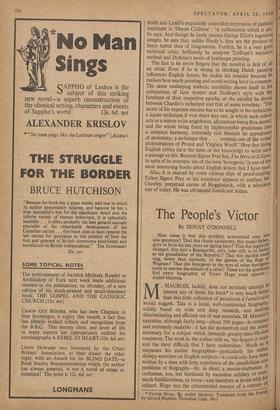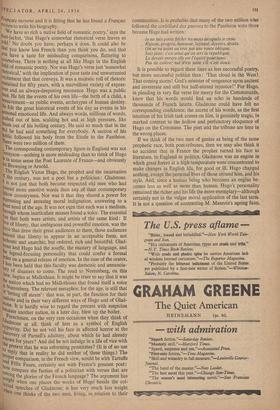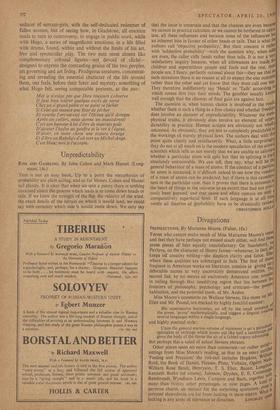The People's Victor
BY DONAT O'DONNELL How came it that this prudent, economical man was also generous? That this chaste adolescent, this model fatW: grew to be in his last years an ageing faun? That this legitirnisc; changed, first into a Bonapartist, only, later still, to be hailed as the grandfather of the Republic? That this pacifist coulf sing, better than anybody, of the glories of the flags °. Wagram? That this bourgeois in the eyes of other bourgeois came to assume the stature of a rebel? These are the questions that every biographer of Victor Hugo must answer. Andre Maurois.
M. MAUROIS, luckily, does not seriously attempt f0 answer any of them; his book* is very much better than this little collection of paradoxes a ramericaine would suggest. This is a lucid, well-constructed biograPh. Y. solidly based on wide and deep research, and making discriminating and efficient use of vast materials. M. Maurois 5 narrative, although fairly long—about 500 pages—is conlImet and extremely readable : it has the momentum and the sweep necessary for a subject which demands greater,-than-life-stZe treatment. The work is, the author tells us, 'the largest in scale and the most difficult that I have undertaken.' Much as it surpasses his earlier biographies—particularly his rather skimpy exercises on English subjects—it could only have been, written by a man with long experience of the possibilities and problems of biography—by, in short, a master-craftsman. P'. craftsman, too, not burdened by excessive subtlety or over much fastidiousness, or irony—and therefore at home with his, subject. Hugo was the concentrated essence of a century 01 * VICTOR Huoo. Ely Andrd Maurois. Translated from the 1-tench by Gerard Hopkins. tfonathan Cape, 30s.) Francais moyens and it is fitting that he has found a Franorus 'HoYen to write his biography. We have so rich a native field of romantic poetry,' says the dust-jacket, 'that Hugo's somewhat rhetorical verse leaves us told.' No doubt you have; perhaps it does. It could also be that you know less French than you think you do, and that You have a taste for misleading comparisons, flattering to Yourselves. There is nothing at all like Hugo in the English kid of romantic poetry. Nor was Hugo's verse just 'somewhat rhetorical,' with the implication of poor taste and unwarranted excitement that that conveys. It was a majestic roll of rhetoric sustained for fifty years, with a marvellous variety of expres- sion and an always-deepening resonance. Hugo was a public tnah. He felt the events of his own life—the birth of a child, a t reuvement—as public events, archetypes of human destiny. le felt the great historical events of his day as events in his personal emotional life. And always words, millions of words, lushed out of him, scalding hot and at high pressure, like `team out of his boiling century. He said so much that in the end he had said something for everybody. A section of his Public followed his body from the Etoile to the Pantheon. There were two million of them.
1, The corresponding contemporary figure in England was not Tennyson—nothing is more misleading than to think of Hugo in some sense the Poet Laureate of France—and obviously to Browning or Arnold. The Efiglish Victor Hugo, the prophet and the incarnation the century, was not a poet but a politician : Gladstone. is not just that both became respected old men who had uttered more emotive words than any of their contemporary 1143‘v countrymen. Nor was it that they shared a power for xpressing and arousing moral indignation, answering to a Feat need of the age. It Was not even that each was a medium, troughwhom inarticulate masses found a voice. The essential ‘aS that both were artists, and artists of the same kind : If eve of liberty, that ambiguous and powerful emotion, was the 're.e that drew their great audiences to them, those audiences desired that liberty to appear in an acceptable form, not helloate and anarchic, but ordered, rich and beautiful. Glad- 'tone and Hugo had the souffle, the mastery of language, and i 741 legend-focusing personality that could confer a formal has on a general release of emotion. In the case of the orator, , nas been held that this faculty was dxmonic and annuncia- °rY of disasters to come. The road to Nuremberg, on this 1 begins at Midlothian. It might be truer to say that it was , nation which had no Midlothians that found itself voice ;t t,, Nuremberg. The relevant metaphor, for the age, is still that letting off steam': that was, in part. the function for their cations and in their very different ways of Hugo and of Glad- iktl°ne. It is hardly wise to regard the process with suspicion because another nation, in a later day, blew up the boiler. Frenchmen, on the very rare occasions when they think of Gladstone kt all, think of him as a symbol of English (1:1)°crisY. Did he not veil his face in affected horror at the lscovery of Parnell's adultery, about which he had already k the for years? And did he not indulge in a life of vice with 0 tlie pretext that he was reforming prostittites? (It is of no use o reply that in reality he did neither og these things.) The proper comparison, in the French view, would be with Tartuffe hnod Fdlix Faure, certainly not with France's greatest poet: zinvy Compare the fustian of a politician with verses that are w 1Prig the glories of the French language? The argument has ksight when one places the works of Hugo beside the col- wheted speeches of Gladstone; it has very much less weight Cu One thinks of the two men, living, in relation to their • communities. It is probable that many of the two million who followed the corbillard des pauvres to the Pantheon were there because Hugo had written :
Je ne Pais point flecItir les mots auxquels je crois Raison, progres, honneur, loyaute, devoirs, droits. On ne va point au vrai par une route oblique. Sois juste: c'est ainsi qu'on serf la republique Le devoir envers elle est l'equite pour sous: Pas de colare: nul West juste s'il n'est doux.
It is possible to regard these lines as less successful poetry. but more successful politics than : 'That cloud in the West!, That coming storm ! God's minister of vengeance upon ancient and inveterate and still but half-atoned injustice!' For Hugo, in pleading in very flat verse for mercy for the Communards, knew that his • words would find an echo in hundreds of thousands of French hearts. Gladstone could have felt no corresponding confidence; the accent of his words, as the first intuition of his Irish task comes on him, is genuinely tragic, in marked contrast to the hollow and perfunctory eloquence of Hugo on the Commune. The poet and the tribune are here in the wrong places.
If we think of the two men of genius as being of the same prophetic race, both poet-tribunes, then we may also think it no accident that in France the prophet turned his face to literature, in England to politics. Gladstone was an engine in which great forces at a high temperature were concentrated to make changes in English life, for good or ill. Hugo changed nothing, except the personal lives of those around him, and his style. And, since a human being who becomes an engine be- comes less as well as more than human, Hugo's personality remained the richer and his life the more exemplary—although certainly not in the vulgar moral application of the last term. It is not a question of contrasting M. Maurois's ageing faun. seducer of servant-girls, with the self-dedicated redeemer of fallen women, but of seeing how, in Gladstone, all emotion tends to turn to controversy, to engage in public work, while with Hugo, a series of magnificent emotions, in a life filled with drama, found, within and without the limits of his art, free and spectacular play. The two men seem almost like complementary colossal figures—not devoid of cliché— designed to express the contrasting genius of the two peoples, art governing and art living. Prodigious creatures, concentrat- ing and revealing the essential character of the life around them, one feels, before their force and mystery, something of what Hugo felt, seeing comparable portents, at the zoo : Moi je n'exige pas que Dieu toujours s'observe 11 faut Bien tolerer quelque exci,s de verve Chez un si grand poete et tie point se filcher Si Cella qui nuance one fleur de pecker Et courbe stir l'Ocean qu'il dotnpte - Apres 4itz colibri, nous donne un mastodontel
• C'est son hunteur a lid d'etre de tnauvais goat D'ajouter l'hydre au goufire et le ver a l'egout, D'avoir, en !owe chose tine stature etrange Et d'etre un Rabelais d'oa sort un Michel-Ange. C'est Dieu; mot je l'accepte.




















































 Previous page
Previous page